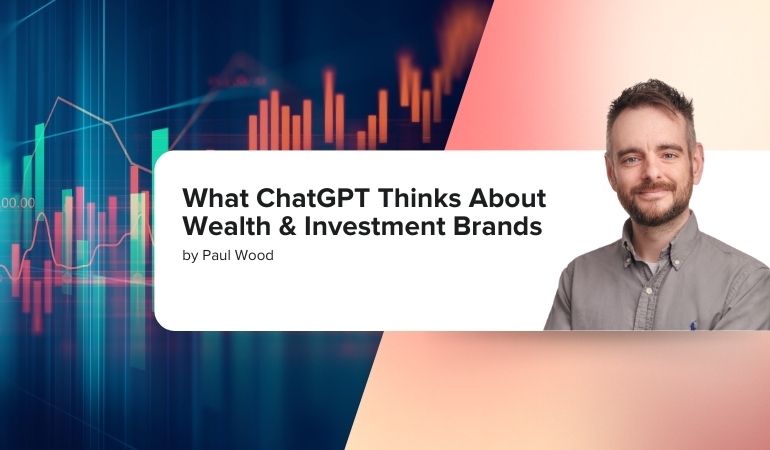Last week, I had the opportunity to test out SEOmonitor’s new AI tracking feature. It uses lists of keywords (uploaded by the user) as ‘prompts’ it sends to ChatGPT. The tool collects ChatGPT’s response and analyses the results.
Tracking AI results is a tricky business. Unlike ‘classic’ online search, which is predominantly keyword-driven, AI tools encourage users to work with elaborate prompts.
The challenge is simple: how can a marketer possibly foresee the variety of prompts in which their brand should be visible?
SEOmonitor’s response to this challenge appealed to me. Rather than attempt some trickery, it has taken a simpler path. It uses lists of keywords.
So, rather than asking marketers to come up with hundreds of ways of searching for:
‘I am looking to take my first steps into investing. I have a small amount of savings and have heard ISAs may be a good thing to look at. How should I get started, and are there any companies known for being easy to use and offering a good product?’
It instead uses your existing keyword list:
“best online brokers UK”
The flaw with this approach is obvious; how can we be sure that the answer ChatGPT provides for this keyword is the same as the more elaborate example above?
The truth is, we can’t be sure, at least not at any significant scale.
Does this matter, though? I don’t think it does. As with ‘classic’ keyword rankings, I don’t believe we’re looking for 100% accuracy; I think we’re looking for a peek into reality.
Tracking brand mentions in AI tools like ChatGPT is, for now at least, a fool’s errand. Tracking responses to simple keywords, however, is far more realistic.
Tracking the wealth and investments sector
Using this new method of tracking, I carried out a test using 34 keywords, all related to the wealth and investment market.
The results were interesting. 30 of the keywords, that’s 90% of searches, resulted in what you might refer to as a ‘commercial’ response from ChatGPT, meaning that it outlined brands and solutions the user could choose to proceed with.
Three of the keywords delivered educational responses, with no brand mentions, and one response was entirely incorrect; it assumed we were asking about a similarly named area of IT.
Across the 30 commercial responses, 40 different wealth and investment brands were named. The average number of brands mentioned per response was ten.
As you may expect, some brands fare better than others. The most mentioned were very clearly in the lead:
- Interactive Investor received 24 mentions
- AJ Bell had 22 mentions
- Trading 212 had 19 mentions
- Freetrade and Nutmeg both had 18 mentions
The average number of mentions each brand received across the keyword list was 7.2.
InvestEngine and Freetrade appeared 16 and 18 times respectively, but crucially were the first brands mentioned four times each (ie, they were ‘ranking’ in position one).
Where does ChatGPT get its information in the wealth and investments sector?
This, I believe, is the real ‘gold dust’. The citations give us a clue as to how ChatGPT decides to prepare its response.
Across all of the keywords tested, ChatGPT referred us to 346 different URLs from across 161 different domains.
There were an average of 17 citations per response in ChatGPT.
This, I believe, is the real ‘gold dust’. The citations give us a clue as to how ChatGPT decides to prepare its response.
The most cited domains were as follows:
- en.wikipedia.org provided 87 different URLs
- forbes.com provided 40 URLs
- moneyweek.com provided 35 URLs
- moneymagpie.com provided 19 URLs
- reddit.com provided 19 URLs
The most cited individual pages were:
- en.wikipedia.org/wiki/Interactive_Investor was cited 19 times
- en.wikipedia.org/wiki/Freetrade was cited 19 times
- en.wikipedia.org/wiki/Trading_212 was cited 12 times
- theguardian.com/money/2025/jun/21/investing-apps-beginners-robo-adviser-platforms-money was cited 11 times
- en.wikipedia.org/wiki/Nutmeg_%28company%29 was cited 10 times
- moneymagpie.com/investment-articles/best-investment-platforms was cited 10 times
- moneyweek.com/investments/best-investing-apps was cited 10 times
It’s worth considering here that some of the keywords we tested were ‘brand comparisons’ (ie, ‘AJ Bell vs Interactive Investor’), which increases the likelihood of brand Wikipedia pages being mentioned. Regardless, it’s important for these brands to know that, perhaps unsurprisingly, Wikipedia operates as a trusted place to point people to.
Conclusions
Tracking ChatGPT brand mentions using short keywords is far from a perfect method. To think it will show you everything is wrong.
It is, however, in my view, the best method we have right now for a couple of key reasons:
- It’s consistent - it’s possible to track the same keywords week in, week out
- It’s scalable - unlike attempting to collate endless prompts, keyword lists are manageable and easy to organise
Rank tracking has never been an exact science. I think this method embraces the same philosophy in the right way.
As AI tools evolve, this method may not be the final answer, but right now, it’s the most practical way to peek into how your brand is positioned in the new search ecosystem.





